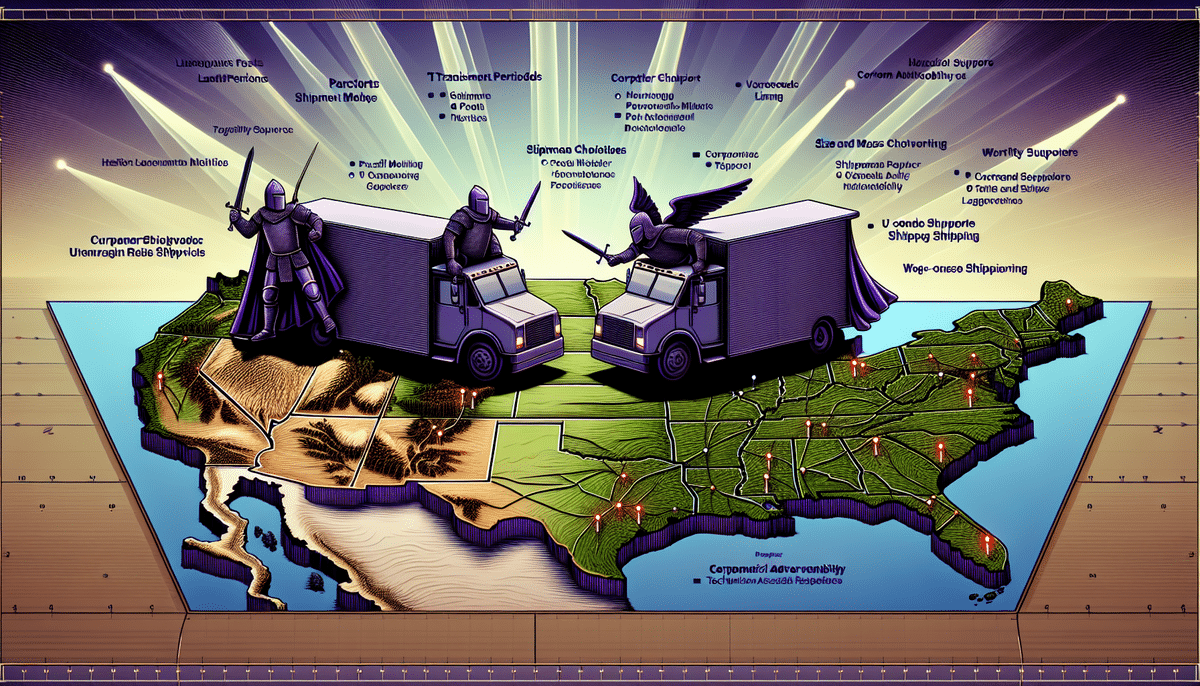UPS vs FedEx: A Comprehensive SEO-Optimized Comparison
When it comes to shipping and logistics, UPS and FedEx are two of the leading providers in the industry. With decades of experience, both companies offer a wide range of services catering to individuals and businesses alike. This comparison delves into various aspects of UPS and FedEx to help you determine which carrier best suits your needs.
Shipping Rates
Cost is a crucial factor when selecting a shipping carrier. Both UPS and FedEx offer competitive rates, but prices can vary based on package size, weight, distance, and service level.
Rate Comparison
- UPS generally offers slightly lower rates for ground shipping compared to FedEx.
- FedEx tends to be more expensive but provides a wider range of express shipping options.
According to Statista, UPS holds a larger market share in ground shipping, making it a cost-effective choice for non-urgent deliveries.
Delivery Time
Both UPS and FedEx are renowned for their reliable delivery schedules, but they excel in different areas.
Ground Shipping
- UPS typically delivers within 2-5 business days for most domestic destinations.
- FedEx offers similar ground shipping times but with a focus on consistent delivery windows.
Express Shipping
- FedEx shines with its express services, offering overnight and next-day delivery options.
- UPS provides expedited shipping but with fewer overnight options compared to FedEx.
Research from the Journal of Commerce highlights FedEx's superior express delivery times as a key differentiator.
Package Tracking
Effective package tracking is essential for both senders and recipients, especially in the age of e-commerce.
UPS Tracking Features
- My Choice: Receive delivery alerts, reroute packages, and request holds at UPS locations.
- Real-time updates on package status and location.
FedEx Tracking Features
- Detailed tracking via website and mobile app with notifications via email or text.
- Comprehensive journey logs and estimated delivery times.
Both carriers offer robust tracking systems, but FedEx provides more detailed journey logs, which can be crucial for high-value or time-sensitive shipments.
International Shipping
For businesses and individuals shipping overseas, the capabilities of UPS and FedEx can make a significant difference.
UPS International Shipping
- Extensive global network with more than 220 countries and territories covered.
- Expertise in customs regulations and comprehensive documentation support.
FedEx International Shipping
- Faster transit times for international shipments, particularly to major markets.
- Advanced online tools for managing international shipments efficiently.
According to the International Parcel Freight Association, UPS maintains a broader global presence, which can enhance reliability in less common destinations.
Customer Service
Reliable customer support is vital for resolving shipping issues and ensuring a smooth experience.
UPS Customer Service
- 24/7 support via phone, email, and online chat.
- High marks for responsiveness and problem resolution.
FedEx Customer Service
- 24/7 support with extensive online resources.
- Recognized for sustainability initiatives and customer-focused programs.
According to Forbes, UPS leads in customer satisfaction ratings, particularly in responsiveness and support effectiveness.
Environmental Sustainability
With increasing awareness of environmental impact, both UPS and FedEx have initiatives to reduce their carbon footprint.
UPS Sustainability Initiatives
- Goal of achieving carbon neutrality by 2050.
- Investments in electric and hybrid vehicles, optimized delivery routes, and eco-friendly packaging.
FedEx Sustainability Initiatives
- Commitment to using electric delivery vans and robotics.
- Efforts to optimize logistics for reduced emissions.
UPS has been recognized by the Green Business Certification Inc. for its aggressive sustainability goals, positioning it as a leader in environmentally responsible logistics.
Choosing the Right Carrier for Your Business
Deciding between UPS and FedEx depends on various factors specific to your business needs.
Key Considerations
- Package Size and Weight: UPS offers higher weight limits for freight shipments, while FedEx provides more flexibility for lighter packages.
- Shipping Volume: Businesses with high shipping volumes may benefit from UPS's extensive network and cost-effective ground shipping rates.
- Delivery Speed: FedEx is ideal for time-sensitive shipments requiring overnight or next-day delivery.
- International Reach: UPS's broader global presence may offer more reliable service in diverse international markets.
Final Recommendations
To make an informed decision:
- Assess your shipping needs, including volume, frequency, and destination.
- Compare rates and services tailored to your specific requirements.
- Consider long-term business goals and sustainability commitments.
By carefully evaluating these factors, you can choose the shipping carrier that best aligns with your business objectives and customer expectations.
Conclusion
Both UPS and FedEx are formidable players in the shipping and logistics industry, each with its strengths. UPS excels in cost-effective ground shipping and extensive international coverage, while FedEx leads in express shipping and innovative delivery solutions. Your choice should hinge on your specific shipping needs, budget, and priorities.
For more detailed information on shipping rates and services, visit the official UPS and FedEx websites.






















